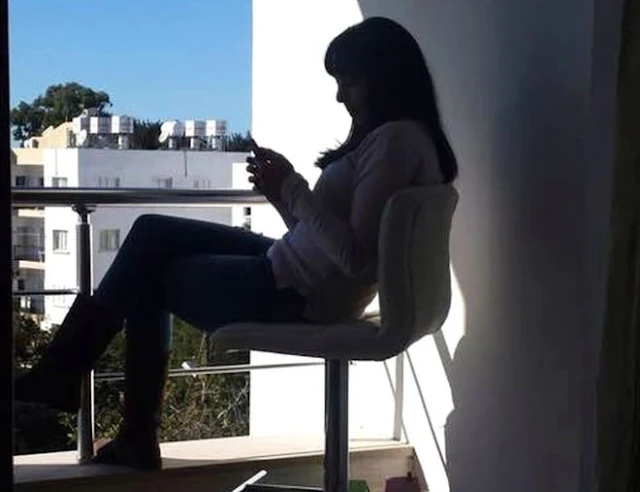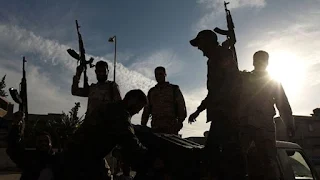Caught in the middle of Libya's kidnapping nightmare
Kidnapping has become a growing
problem in Libya, where three governments and several militia are vying
for power. The BBC's North Africa correspondent Rana Jawad has been
talking to people personally affected.
"My father was kidnapped yesterday."
Not
quite the text message you expect to get from a close friend on a
Friday morning. I called to confirm that it was not a cruel
auto-correction and rushed over to her place. She looked remarkably
composed but exhausted.
Here, in the comfort and safety of neighbouring Tunisia, the insecurities engulfing Libya seem like a galaxy away.
She gets another call, and another, about a dozen in less than an hour.
She
stands, frowning, and clutching the phone, trying to make sense of what
was being communicated to her. She paces, kicks the kitchen chair, and
eventually sits down calmly again.
In post-revolution Libya, either armed gangs or semi-official
militias kidnap people. The motives vary, from ransom, to revenge, to
politics but the devastation and helplessness that the victims' families
experience is the same.
I saw this first-hand through my friend, Lina (not her real name).
Her
68-year-old diabetic father, university professor Salem Beitelmal, was
abducted. Six weeks on, the family is still not entirely sure which
armed group took him or why. But they have learned that his car was
found abandoned on the side of a road, west of the Libyan capital,
Tripoli.
Official statistics are not available but many Libyans I
know have either first-hand experience of being kidnapped or have had a
family member or friend abducted. Most families do not speak out,
fearing that if they go public their loved ones will be killed or
tortured in captivity.
So what happens after a kidnapping?
The
power vacuum in Libya means that in case of an emergency, you call a
friend, a neighbour, and every local militia under the Libyan sun.
Over the past month, I have watched Lina agonize over an
investigation that often entails talking to people she mistrusts. The
family has a pool of contacts she is calling, but they are strangers.
At times, she looked like she was going around in circles and slowly being sucked into a vortex of misinformation.
"You
don't have institutions that you can turn to that are there to protect
and serve the citizens. So the reality then becomes that it is the
citizens who have to take matters into their own hands," she tells me.
"But at the same time there's a strong social network that kind
of replaces that, and that's how Libyans have been dealing with
everything," she says.
- Long-serving ruler Col Muammar Gaddafi was overthrown in October 2011
- Since then there has been no central authority
- Myriad armed militias took control of different parts of the country
- The UN has backed a government based in Tripoli
- There are two other rival governments
Kidnappings in Libya have been on the rise over the past three years.
Current
statistics are not available, but in 2015 the Libyan Red Crescent
Society reported that more than 600 people had gone missing between
February 2014 and April 2015.
No-one is immune - the victims range
from politicians to activists to businessmen to doctors to children.
And the stories are all equally tragic.
Abdel-Moez Banoun, a
high-profile anti-militia activist, disappeared from Tripoli in the late
summer of 2014 and has been deemed untraceable by human rights groups
since.
Here in Tunis, I met a young Libyan woman whose entire
family had fled their home country after a relative was kidnapped and
killed.
Jabir Zain, a young Sudanese activist who grew up in
Libya, was taken by an armed group outside a cafe in Tripoli in late
September.
It happened after he led a group discussion on women's
rights. Human rights groups have described his case as an "enforced
disappearance".
Hanan Salah, a senior researcher with the Human Rights Watch campaign
group, recently visited Libya to document cases of kidnappings. She has
been researching issues in the country for several years, but the
deteriorating security and the dangers that civilians are exposed to
still surprise her.
"I was really shocked at the normalisation of
crime, and in particular the soaring numbers of abductions for ransom,
and extortions by militias and armed gangs," she says.
She remembers one victim's story in particular.
"The
reason he was kidnapped was because the family he was being held by was
trying to pay off the ransom of another kidnapping case," she says.
Nightmare existence
What has surprised Lina the most is the realisation of just how bad things are in her country.
"If
you go to Libya today, during the day… as long as there are no clashes
in the streets, life is normal; people are going to school, to work,
shopping. Cafes and restaurants are filled.
"It gives you this false sense that there is in fact something that's keeping this country together.
"But
then when you're put into this nightmare, you realise that there are no
institutions that you can turn to, and that there is a complete
breakdown."
I ask her if she is angry.
"I'm very angry.
It angers me that we have three governments - not one - that claim power
on the ground, and the reality is that not a single one of them have
real control."
BBC NEWS
















